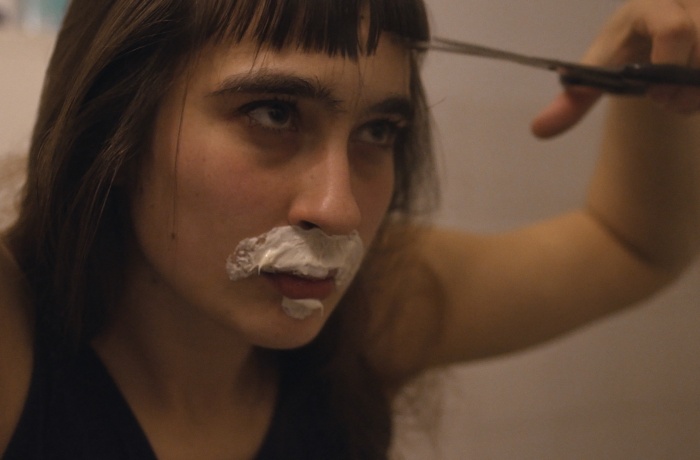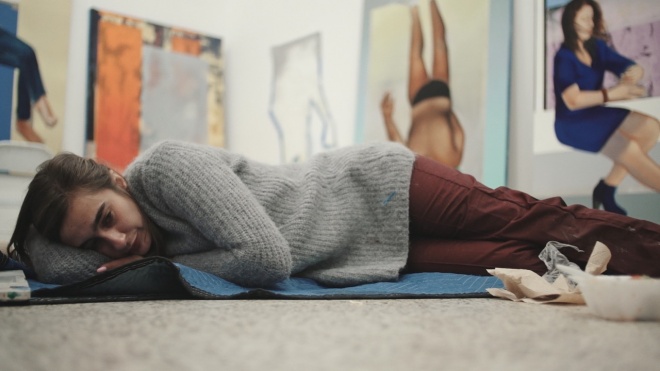Apolonia, Apolonia in Kherson: Documentary about 13 years in an artist’s life
Apolonia, Apolonia in Kherson: Documentary about 13 years in an artist’s life

On 16 December, the SVOYE Education and Training Centre in Kherson hosted a screening of Apolonia, Apolonia as a part of the Travelling Docudays UA. The Danish documentary filmmaker Lea Glob created a portrait film about the French artist Apolonia Sokol — the director filmed the artist’s life for 13 years, between 2009 and 2022.
Apolonia, Apolonia is a film where several storylines intertwine. They all focus on a girl who wants to become successful and who’s searching for herself as a woman and as an artist.
Apolonia’s grandmother was born in Belarus. During Stalinist repressions, her family was deported to Siberia, but the family managed to escape to Poland. The girl’s mother soon left for Paris and married a French man, and that is how Apolonia was born.
Apolonia was born in Paris and grew up in the Bohemian circles of the French capital. Her parents turned an old laundromat in a working class neighbourhood into a theatre where they staged their own plays. Throughout their lives, her parents, and then Apolonia herself, tried to save the theatre from bankruptcy and demolition. But they still lost it.
In the film, Apolonia is looking for her own place in the world of art. She graduates from the Paris Academy of Arts, one of the most prestigious art institutions in Europe, and she wants to break through onto the American and European art scene. She goes to New York, where she becomes an “art slave,” making paintings which another artist sells as his own. Later she finds a job with a collector, where she has to work like a machine, never stopping or slowing down. But he organises an art show for her, invites influential critics and introduces her to the right people.

A still from the film Apolonia, Apolonia
There are also two women in the film who are important for the protagonist. They are the filmmaker Lea Glob, whom Apolonia has let into her life, whom she trusts and whom she allows to film her most intimate moments. A storyline about the director herself is also woven into the film: Lea gets pregnant and gives birth, ends up in a coma, survives by miracle, and goes through 36 surgeries. The other woman is Apolonia’s close friend, a Ukrainian co-founder of the Femen movement, Oksana Shachko. In 2016, she killed herself in Paris. The protagonists of Apolonia, Apolonia contemplate art, love, motherhood, and think about how to achieve success in a world dominated by patriarchy and capitalism without losing yourself.
In one of the scenes, Apolonia asks her father if he has any other kids, because she herself does not plan to have children. She says, “I want to paint, and that’s impossible to combine.” In another scene she confesses that she wishes he had no gender, because “when I paint, I can’t be a woman.”
After some time, Apolonia Sokol is recognised as a leader of contemporary art, and the film also captures the moment of this long-awaited success.
After the screening in Kherson, the audience shared their thoughts about the film. Here are some of them.
Ihor Tsurkan, executive director of NGO Separate Unit of Kherson Regional League of Social Workers of Ukraine:
“It’s a film about a woman, an artist who searches for herself in art and life. She speaks about liberty, freedom, and creativity. She thinks about who an artist is and who they should be. The Travelling Docudays UA aims, first of all, to reveal humanity’s problems, defend human rights, particularly women’s rights. These are the problems raised in the film. We saw a complex story of a person from Belarus who has known what camps and relocation to Poland are.
“Apolonia was born in Paris in culture circles where you have to work like an assembly line. She tries to find herself there. She asks herself who she is, why she exists, whether anyone needs what she does. The film is complex and emotional. It is also about the fact that art cannot develop without financial support.”

Screening of the film Apolonia, Apolonia at the Traveling Docudays UA in Kherson
Natalia Shatilova, Head of NGP Hromada UA, acting head of the Dnipro District Organisation of the Ukrainian Red Cross Society:
“It is a film about the search, path, and choice. This really resonates with me. This year, one of my friends died of an illness and another took her own life. Every person chooses their own path. Lea decided to give birth, have a family, but she didn’t give up the art of filmmaking. Oksana was lost, she killed herself. And it’s her choice which she was entitled to. Apolonia also makes her choice deliberately, despite all the obstacles. And every time she chooses herself, art, self-identification. It is a film about human rights which she has to defend every day.”
Volodymyr Kliutsevskyi, deputy head of the Kherson Regional State Administration:
“The film is about a person with her own position who is fighting. And about freedom. We understand what freedom is, we value it. Because we’ve been under occupation, we’ve felt shackled, we’ve felt humiliated. We feel the artist’s freedom. She creates better, more alive paintings when she’s free, when she’s not engaged for money.”
Author: Iryna Bulanenko, journalist at the Vgoru Media Platform.
Header photo: A still from the film Apolonia, Apolonia.
The 20th Travelling Docudays UA is held with the support of the Embassy of Sweden in Ukraine, Embassy of Switzerland in Ukraine, US Embassy in Ukraine. The opinions, conclusions or recommendations do not necessarily reflect the views of the governments, charities, or companies of these countries. Responsibility for the contents of the material lies solely on its authors.












